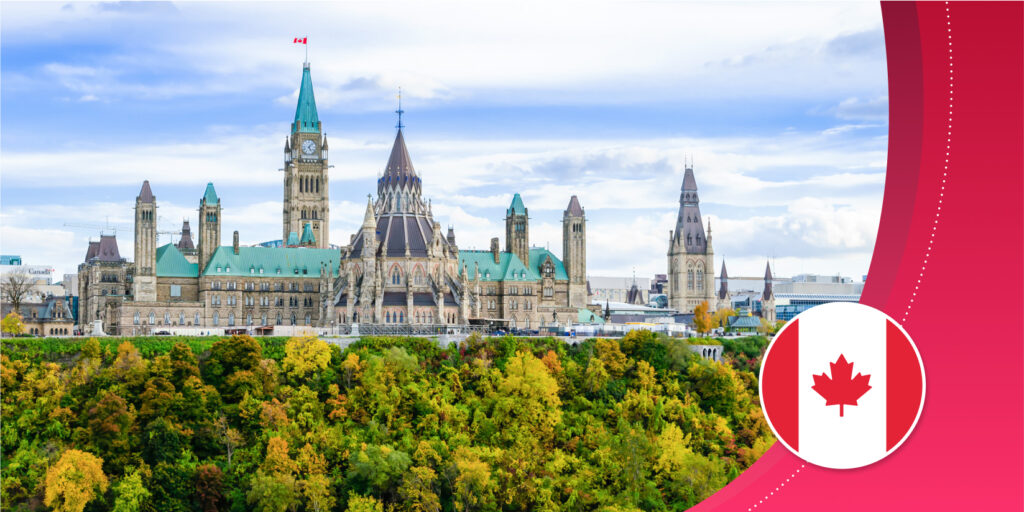If you’re thinking of studying in Canada, and are fluent in French, the new Francophone Minority Communities Student Pilot (FMCSP) might be just what you’re looking for. It’s open to future international students from select countries who plan to study outside of the province of Quebec.
Curious? Below, we’ll look closer at who is eligible for FMCSP, plus what the program offers future international students.
Note: This article is provided as information only, and is subject to change as policies and participants are updated. This post was last updated on August 27, 2024.
For official guidance relating to Canadian student visas and immigration, visit the Immigration, Refugees and Citizenship Canada (IRCC) website, or connect with a Registered Canadian Immigration Consultant.

What Is the Francophone Minority Communities Student Pilot?
The FMCSP program encourages international students to study at specific designated learning institutions (DLIs) in Francophone minority communities outside of Quebec. FMCSP was created to help improve study permit approval rates for French-speaking international students, and make “access to Canada’s International Student Program fairer for a wide range of international students.”
Students eligible for FMCSP don’t have to demonstrate they’ll leave Canada after their studies, as it’s seen as a dual study-work pathway. Also, their proof of financial support varies. Instead of being the same across Canada, the proof of financial support is set at 75% of the low-income cut-off amount for a community of that size.
So, how is FMCSP different from a standard study permit?
Basically, FMCSP students won’t have to prove they plan to leave Canada after graduation like students applying through the regular study permit stream have had to do in the past. Contrasting messages about dual intent has always been a source of confusion for students, so this change is ultimately positive, as it adds transparency and clarity to the application process.
Another benefit of FMCSP is that its financial requirements adapt to suit the cost of living in different communities, depending on their size. Students living in larger cities must show a higher proof of financial support than someone in a small town where the cost of living is lower. In fact, FMCSP students headed to campuses in cities with fewer than 500,000 people can show a proof of finances amount that’s lower than the current standard of C$20,635.
Here’s how the FMCSP proof of finances amount changes in smaller communities:
- If the campus you’re enrolled at is in a community with a population of 100,000 to 499,999, your proof of finances amount is C$17,772.
- If the population is 30,000 to 99,999, your proof of finances amount is C$17,662.
- If the population is under 30,000, your proof of finances amount is C$16,161.
- If the campus is in a rural area, your proof of finances amount is C$14,206.
Remember, these are amounts for single students. If you’re bringing a partner or children, the minimum proof of finances will increase.
Note: The average cost of living varies by community. Minimum amounts, like the one above, may not fully cover your expenses. It’s smart to use a cost of living calculator to estimate your costs before arriving.
It’s also important to remember that FMCSP participants are exempt from the current study permit cap system, even at the undergraduate level. So, if you’re eligible to apply for a study permit through FMSCP, you won’t have to submit a provincial attestation letter (PAL) with your study permit application. However, you must submit a letter of acceptance from a participating DLI which states you’re applying under FMCSP instead.
FMCSP students can also access different settlement services while they’re completing their degree or diploma. If your partner/spouse is joining you in Canada, they may be eligible for their own visitor visa, study permit, or an open work permit. Spouses and partners must submit their own visa application to IRCC.
After graduating, FMCSP also offers a path for participating students and their families (a spouse or common-law partner and/or dependent children) to live in Francophone communities across Canada as permanent residents.

Can I Apply for the Francophone Minority Communities Student Pilot?
- Be a citizen of an eligible African, American, or Middle Eastern country.
- Live outside of Canada when you apply.
- Enrol in a program that meets the pilot program’s requirements.
- Have a letter of acceptance from a participating DLI. It must include that you’re applying for a study permit via FMCSP, and that your study program meets the requirements.
- Have enough money to pay for tuition and living expenses for yourself and any family members accompanying you.
- Prove you can speak, read, listen, and write in French at a Level 5 or higher on the Niveaux de compétence linguistique canadiens scale. You may use results from either the Test d’évaluation de français (TEF Canada) or Test de connaissance du français (TCF Canada).
- Provide biometric information at a separate in-person appointment.
- Provide other documents (like a medical exam or police certificate) as requested.
As you apply for your study program, you must tell your academic institution that you want to apply under the FMCSP. This will allow the institution to include that information on your letter of acceptance.

How Many Students Can Participate?
In its first year (starting in August 2024), FMCSP may support up to 2,300 study permits for international students who have been accepted into eligible programs at specific DLIs. These permits are exempt from the general study permit caps.
The maximum number of permits for FMCSP’s second year will be determined by August 2025.
I Want to Participate in FMCSP. Where Can I Study?
Post-secondary institution partners will be announced on the pilot program’s official page.
As of August 26, 2024, select September 2025 courses at the Collège Communautaire du Nouveau-Brunswick, the Université de Hearst, and the University of Alberta are eligible.
Note that not all postsecondary programs are eligible for FMCSP—even if they’re at a participating DLI.
FMCSP study programs must:
- Be a full-time program at the post-secondary level.
- Lead to a degree or diploma.
- Last two years or more.
- Have over 50% of its classes taught in French.

We hope this information about the Francophone Minority Communities Student Pilot has inspired you to consider some of Canada’s most unique and welcoming communities for the next step in your academic journey. We’ll update this post as more information is available, so be sure to bookmark it and check back regularly!
Ready to start your study abroad journey to Canada? The free-to-use ApplyBoard platform can connect you with programs that fit your academic goals and budget. Try it today!



